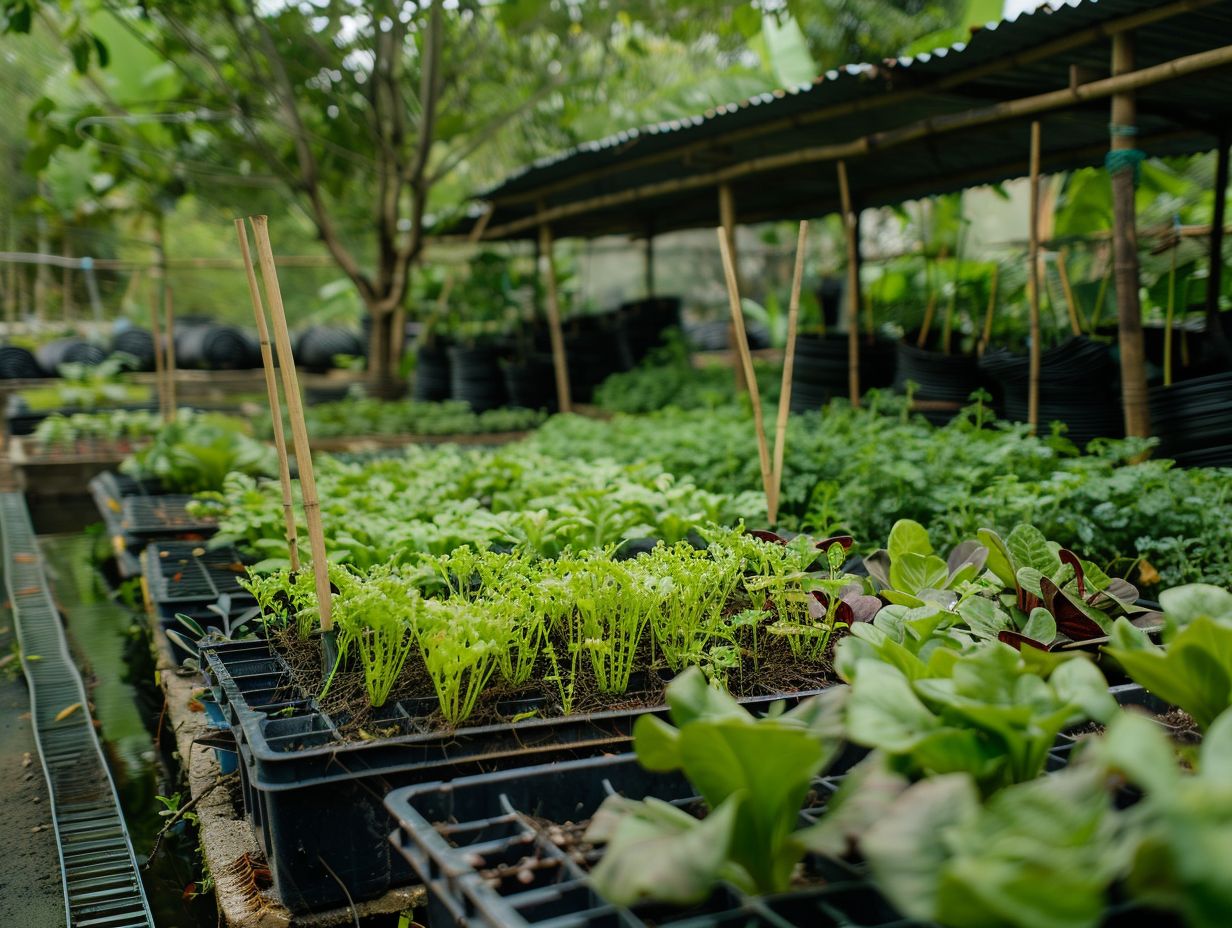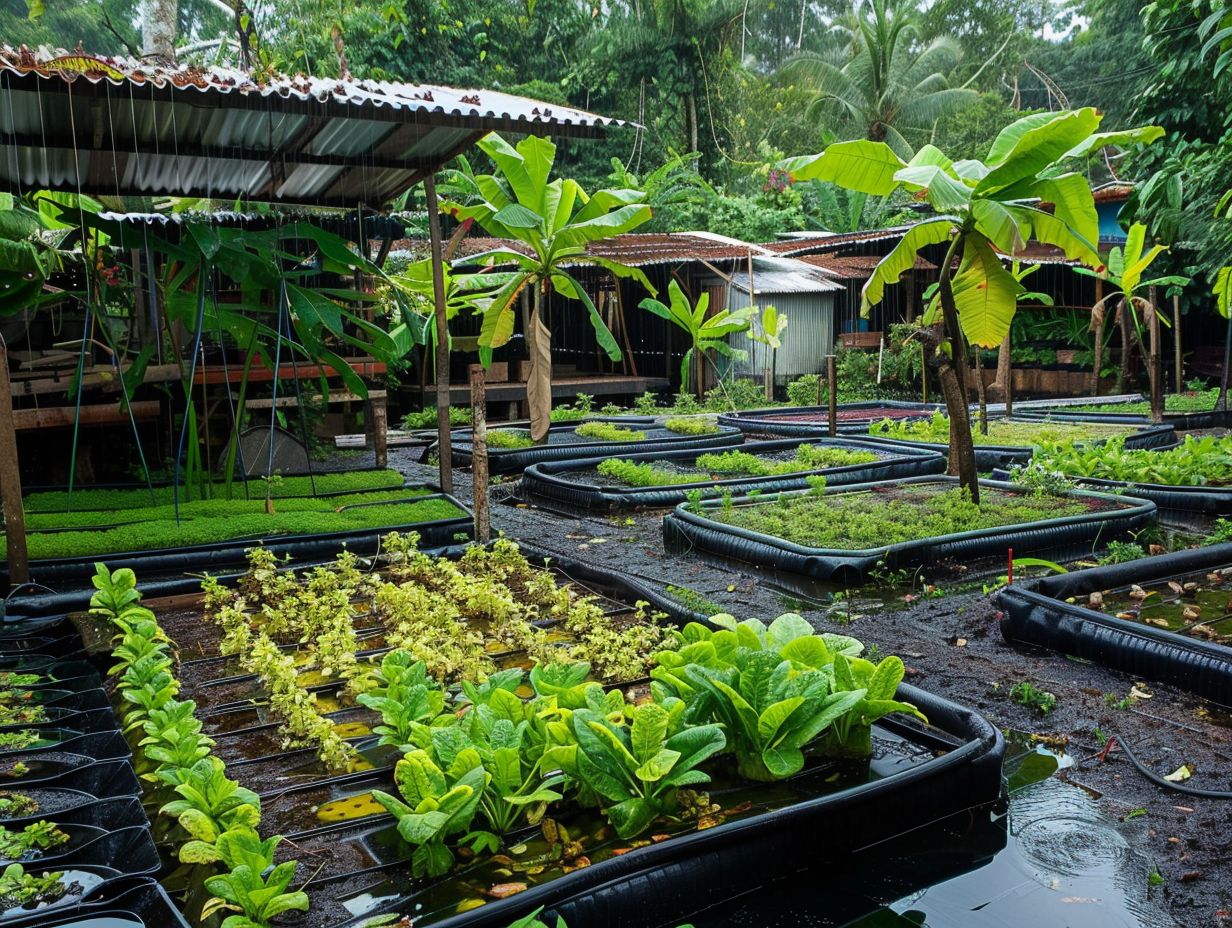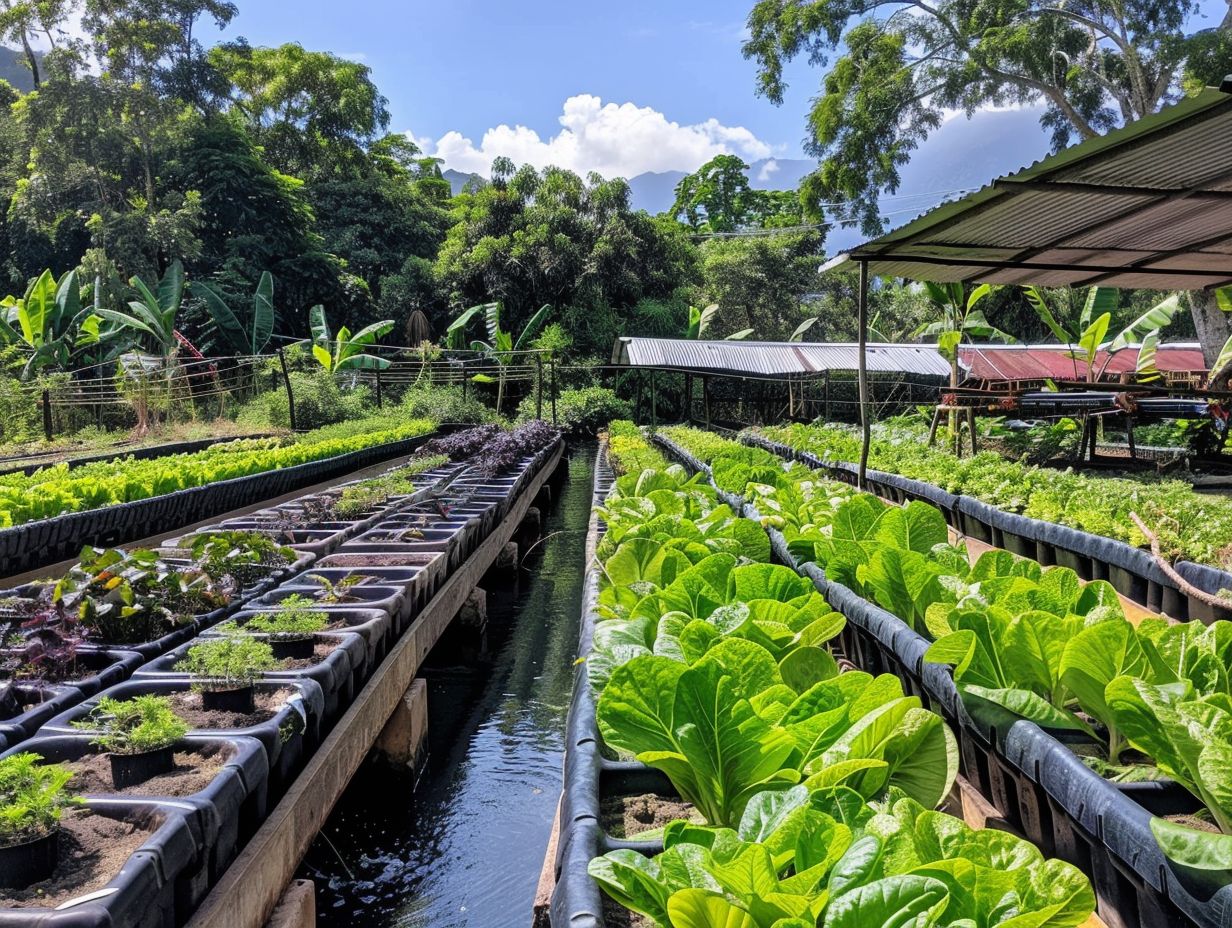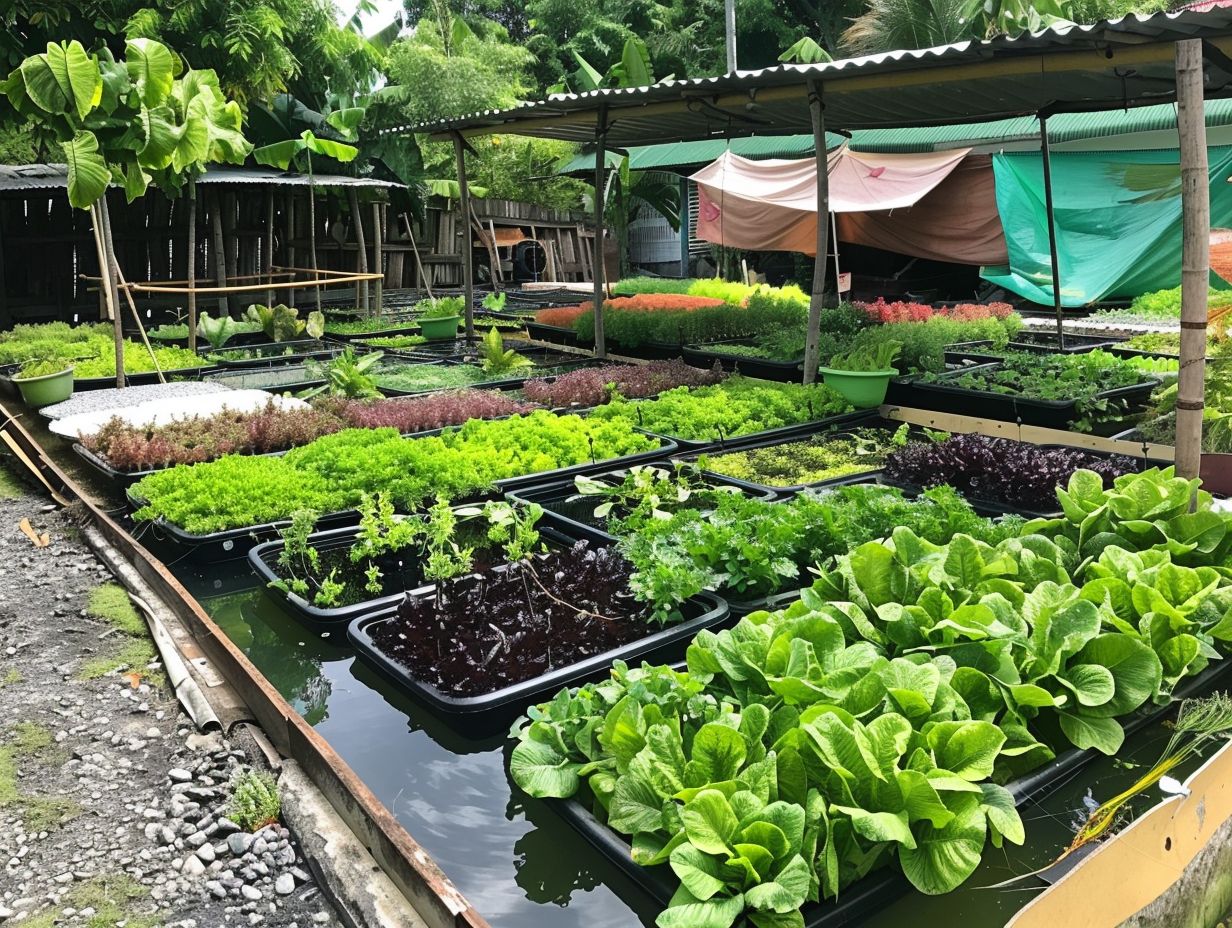Curious about hydroponic farming and its popularity in the Philippines?
This article explores the advantages and disadvantages of this innovative agricultural technique.
Discover where you can learn hydroponic farming, from government agencies to universities.
Learn about the different courses available, skills required, and costs involved.
Find out about the job opportunities in hydroponic farming, from farm manager to consultant.
Stay tuned to uncover all you need to know about hydroponic farming in the Philippines!
Key Takeaways:

What is Hydroponic Farming?
Hydroponic farming is a soilless method of agriculture that utilizes nutrient-rich water solutions to grow high-value crops such as vegetables and fruits in urban settings. This innovative technique, including SNAP hydroponics and aquaponics, promotes efficient plant growth by providing mineral nutrient solutions directly to the roots.
One of the key advantages of hydroponic farming is its water efficiency, with studies showing up to 90% less water usage compared to traditional soil farming. This makes it an environmentally friendly option, especially in urban areas where water scarcity is a concern. Hydroponic systems allow for precise control over nutrient levels, pH balance, and environmental conditions, leading to higher yields and faster growth rates. The versatility of hydroponics enables cultivation all year round, regardless of seasonal limitations, offering a steady supply of fresh produce for urban communities.
Why is Hydroponic Farming Popular in the Philippines?
Hydroponic farming has gained popularity in the Philippines due to the pressing issue of food shortages and the advocacy of key figures like William Dar, the Secretary of the Department of Agriculture. Cities like Manila and Quezon City have embraced hydroponic farming, with dedicated training facilities such as the Urban Agri Hydro Hub Learning Center providing education on innovative farming methods.
These initiatives are a response to the increasing population and limited agricultural land in the country, driving the need for efficient and sustainable farming practices. The Philippine government has also launched programs to promote urban agriculture, encouraging city residents to grow their own food through hydroponic systems.
Plus government support, small-scale urban agriculture projects have sprung up across the country, give the power toing communities to take control of their food security. Organizations like Agricoolture Inc. have been instrumental in promoting hydroponics as a viable solution to food scarcity.
What Are the Advantages of Hydroponic Farming?
Hydroponic farming offers numerous advantages, including the ability to practice alternative farming methods, optimize vegetable production through aquaponics units, increase harvest yields, reduce pesticide usage, promote sustainability, mitigate environmental impacts, utilize urban spaces efficiently, and align with Laudato Si Goals for ecological economics.
One of the key benefits of hydroponic farming is its water efficiency, as it uses less water compared to traditional soil-based farming methods. Hydroponic systems enable precise control over nutrient delivery, resulting in enhanced crop quality and faster growth rates. With the ability to grow crops vertically, this method maximizes space utilization, making it ideal for urban areas where land availability is limited. The controlled environment in hydroponic systems also leads to fewer pests and diseases, decreasing the need for pesticides and contributing to healthier produce.
What Are the Disadvantages of Hydroponic Farming?
Despite its benefits, hydroponic farming also faces challenges such as susceptibility to pests, diseases, and nutrient deficiencies due to the controlled environment. Managing these issues effectively is crucial to maintaining successful hydroponic operations.
One common challenge in hydroponic farming is pest infestation, which can quickly spread due to the optimal growing conditions offered. Controlling pests without traditional pesticides becomes a task that requires careful planning and constant monitoring to prevent crop damage.
Another obstacle is the occurrence of plant diseases, which can rapidly affect an entire hydroponic setup. Implementing strict hygiene protocols and utilizing disease-resistant plant varieties are essential measures to mitigate this risk.
Maintaining the correct nutrient balance in the water solution is vital. Without proper monitoring, nutrient imbalances can lead to stunted growth, nutrient deficiencies, or toxic build-ups, impacting the overall yield and quality of the produce.
Where Can You Learn Hydroponic Farming in the Philippines?
Individuals interested in learning hydroponic farming in the Philippines have various options, including government agencies, private organizations, universities, and colleges that offer comprehensive training programs and skill development initiatives.
Many government agencies in the Philippines such as the Department of Agriculture provide workshops, seminars, and online resources to educate aspiring hydroponic farmers. Private organizations like Urban Farming Philippines offer specialized courses and certification programs in hydroponics. In addition, renowned educational institutions such as the University of the Philippines and Ateneo de Manila University have incorporated hydroponic farming into their agricultural curriculum.
Hands-on experiences are crucial for refining skills, and these can be gained through internships at hydroponic farms, practical sessions at research centers, and field visits organized by agricultural institutes.
Government Agencies
Government agencies such as the Department of Agriculture in the Philippines play a vital role in promoting education and food security through initiatives that support hydroponic farming. Collaborative programs with organizations like the Philippine Association of Agriculturists Inc. (PAA) and the implementation of SNAP hydroponics contribute to sustainable agriculture practices.
These agencies provide valuable resources and technical assistance to farmers looking to adopt hydroponic techniques, ensuring they have the knowledge and skills necessary for success. In addition, partnerships with agricultural associations allow for the exchange of best practices and the development of innovative solutions to challenges in the industry.
Through training workshops, informational sessions, and certification programs, the Department of Agriculture give the power tos individuals and communities to embrace modern farming methods that enhance productivity and minimize environmental impact.
Private Organizations
 Private organizations like The Freshest in Manila offer specialized hydroponic training programs that cover aquaponics, aquaculture, and the entire process from raising fish to seeding plants and harvesting fresh produce. These hands-on experiences provide valuable insights into sustainable farming practices.
Private organizations like The Freshest in Manila offer specialized hydroponic training programs that cover aquaponics, aquaculture, and the entire process from raising fish to seeding plants and harvesting fresh produce. These hands-on experiences provide valuable insights into sustainable farming practices.
Participants in these programs are immersed in a comprehensive learning environment that incorporates both theoretical knowledge and practical skills. They get the opportunity to understand the delicate balance between the fish and plant ecosystems, as well as the importance of maintaining water quality and nutrient levels.
Through engaging workshops and interactive sessions, individuals learn how to optimize plant growth, manage fish health, and ensure a successful production cycle from start to finish. The holistic approach taken by organizations like The Freshest fosters a deeper appreciation for the interconnectedness of aquaponics and aquaculture.
Universities and Colleges
Universities and colleges like Saint Louis University in Baguio City provide educational opportunities for hydroponic farming through collaborations with institutions like the American Corner Baguio. Faculty members and industry experts serve as resource speakers, enriching the learning experience for students interested in SNAP hydroponics.
The offerings extend beyond traditional lectures, with hands-on training in modern hydroponic techniques, providing students with practical skills applicable to real-world settings. The involvement of faculty members specializing in sustainable agriculture ensures a comprehensive curriculum, covering topics ranging from nutrient management to sustainable farming practices.
Collaborations with industry partners offer students valuable networking opportunities and insights into the latest technological advancements shaping the agricultural landscape. Guest speakers from renowned organizations share their expertise, exposing students to diverse perspectives and innovative approaches in hydroponic farming.
What Are the Courses Available for Hydroponic Farming in the Philippines?
Various courses are available for hydroponic farming in the Philippines, catering to different skill levels and interests. Programs like the SNAP hydroponics training and initiatives like the Cagayan de Oro City Jail-Male Dormitory Training led by Ronald Ian Camaddo and Senior Jail Officer 3 Aldous S. Yba ez offer unique learning opportunities.
These courses aim to equip individuals with the necessary knowledge and practical skills to excel in hydroponic farming. From basic introductory courses for beginners to advanced programs focusing on specific techniques such as nutrient management and crop optimization, there is a wide range of options to choose from.
Specialized training modules cater to niche interests including vertical farming, aquaponics integration, and sustainable practices. Participants also benefit from hands-on experience through internships and on-site demonstrations taught by industry experts.
Short Courses
Short courses in hydroponic farming cover essential topics such as horticulture, aquaponics, and SNAP hydroponics. Participants learn about nutrient solutions, plant growth techniques, and sustainable agriculture practices in a condensed format.
Delving deeper into the curriculum, these courses typically explore the principles of plant nutrition, irrigation systems, and temperature management in a controlled environment. Students gain hands-on experience in setting up different hydroponic systems such as deep water culture and nutrient film technique. They also study the role of pH levels, lighting systems, and air circulation in optimizing plant growth.
The courses discuss pest and disease management strategies specific to hydroponic farming, emphasizing integrated pest management techniques and organic solutions. Understanding the importance of monitoring water quality and root health is also a crucial aspect of these programs.
Certificate Programs
Certificate programs in hydroponic farming offer in-depth knowledge on urban agriculture, SNAP hydroponics, vegetable production, and the cultivation of crops like lettuce seeds. These focused programs equip individuals with the skills needed for successful hydroponic practices.
Through structured modules, students delve into the principles of water-based cultivation, advanced nutrient management, and sustainable urban agriculture techniques. They also learn about innovative growing methods such as vertical farming and aquaponics, broadening their understanding of efficient crop production in constrained spaces. These programs emphasize the importance of environmental stewardship, teaching participants how to minimize water usage and reduce waste in hydroponic systems. Graduates not only gain theoretical knowledge but also acquire hands-on experience through practical sessions, preparing them for careers in the evolving field of hydroponics.
Degree Programs
Degree programs in hydroponic farming provide comprehensive education on aquaponics, aquaculture, and related topics. Students learn from experienced faculty members and industry professionals who share valuable insights as resource speakers.
These degree programs typically offer a structured curriculum that covers fundamental principles, innovative techniques, and hands-on experiences in cultivating plants using hydroponic systems. Through specialized courses, students explore the symbiotic relationship between aquatic animals and plants in aquaponics setups, gaining a deep understanding of sustainable food production methods.
Faculty expertise in fields like biology, agriculture, and environmental science enhances the learning process, while guest speakers from renowned research institutions, commercial farms, and government agencies provide real-world perspectives and industry trends.
What Are the Skills Required for Hydroponic Farming?
Successful hydroponic farming requires a diverse set of skills, including knowledge of aquaponics, aquaculture, plant growth techniques, and proficiency in managing mineral nutrient solutions. Individuals engaging in this innovative practice must possess a blend of technical expertise and practical abilities.
Understanding the principles of aquaponics involves mastering the interconnected systems of plants and aquatic life for mutual benefit, enhancing sustainability in a hydroponic environment. Aquaculture proficiency is vital for maintaining healthy aquatic ecosystems within the hydroponic setup, enabling the symbiotic relationship between fish and plants to flourish. To optimize plant growth, familiarity with various growth strategies like aeroponics or nutrient film technique is essential for cultivating robust and thriving crops.
What Are the Costs Involved in Learning Hydroponic Farming in the Philippines?

Understanding the costs associated with learning hydroponic farming in the Philippines is essential for individuals pursuing this field.
When looking into the financial considerations of embarking on hydroponic farming education, aspiring enthusiasts should factor in various elements. Tuition fees for specialized courses or workshops play a significant role in the overall expense. Costs for materials such as growth mediums, nutrients, and hydroponic systems should be accounted for. Equipment purchases, like lighting fixtures and irrigation systems, are key investments. Individuals must anticipate expenses related to transportation to and from training venues, as well as accommodation if opting for residential programs. Altogether, a comprehensive financial strategy is crucial for a successful educational journey in hydroponic farming.
Tuition Fees
Tuition fees for hydroponic farming education programs vary based on the type of courses, the duration of study, and the inclusion of specialized modules such as SNAP hydroponics and aquaponics. Prospective learners should consider these costs when planning their educational pursuits.
The location and reputation of the institution offering the hydroponic farming courses can significantly impact the overall fees. Institutions located in urban areas or renowned for their agricultural programs may have higher tuition fees compared to smaller or lesser-known schools.
The mode of instruction, whether online or in-person, can also influence the cost structure. Online courses might be more affordable due to reduced overhead costs.
Materials and Equipment
Acquiring the necessary materials and equipment for hydroponic farming in the Philippines involves investments in tools like SNAP hydroponics systems, aquaponics units, seedlings, and other resources essential for successful cultivation. Understanding the requirements and costs associated with these elements is crucial for aspiring hydroponic farmers.
SNAP hydroponics systems are designed to provide an efficient and controlled environment for plant growth, utilizing nutrient solutions instead of soil. Aquaponics units combine hydroponics with aquaculture, creating a symbiotic ecosystem where fish waste nourishes the plants. Seedlings form the foundation of the hydroponic farm, requiring quality seeds, trays, and a germination area.
Plus these tools, adequate lighting, ventilation systems, pH meters, and water pumps are vital resources needed for hydroponic farming. Maintaining proper nutrient levels, temperature, and humidity is crucial for the success of the crops.
Transportation and Accommodation
Individuals embarking on hydroponic farming learning journeys in the Philippines must account for transportation and accommodation costs associated with attending training programs and accessing specialized facilities. Planning for these expenses is essential for a seamless educational experience.
When considering transportation expenses, factors such as flight tickets, local transfers, and perhaps even renting vehicles need to be taken into consideration. Accommodation costs play a vital role in the overall budget, depending on whether one opts for a hotel stay, homestay, or other lodging options. In the Philippines, the diverse range of accommodation choices and their varying price points present travelers with decisions to make.
Having a clear budgeting strategy is crucial to avoid any financial hiccups during the learning journey. Keeping an eye out for discounts, deals, or group rates for transportation and lodging can help in reducing the overall costs. By setting aside a designated amount for travel and accommodation, individuals can ensure that they have a hassle-free experience and can fully focus on gaining knowledge and skills in hydroponic farming.
What Are the Job Opportunities for Hydroponic Farming in the Philippines?
Hydroponic farming offers diverse job opportunities in the Philippines, ranging from roles such as farm managers and researchers to educators and consultants in the field of agriculture. Individuals with expertise in hydroponic techniques can explore fulfilling career paths that contribute to sustainable farming practices.
Hydroponic farm managers play a crucial role in overseeing day-to-day operations, ensuring crop health and optimal resource utilization. Researchers delve into innovative methods and technologies, driving advancements in hydroponic systems. Educators share knowledge through training programs and workshops, nurturing the next generation of hydroponic farmers. Consultants offer valuable insights and guidance to enhance productivity and profitability in hydroponic enterprises. These diverse roles collectively contribute to the growth and success of the hydroponic farming industry in the Philippines.
Farm Manager
A farm manager in the field of hydroponic farming oversees the daily operations, production processes, and sustainability practices within agricultural settings. This role requires strong management skills, operational expertise, and a commitment to sustainable farming methods.
Having a deep understanding of hydroponic systems, the farm manager must ensure the proper functioning of equipment and manage resource allocation efficiently. They are responsible for monitoring crop health, nutrient levels, and environmental conditions to maximize yield and quality.
- Implementing integrated pest management
- Utilizing data analysis for decision-making
- Adhering to food safety regulations
are key aspects of their role. Effective team leadership, financial acumen, and continuous improvement initiatives are essential for success in this position.
Researcher
Researchers in the realm of hydroponic farming in the Philippines focus on innovative agricultural practices, conducting studies, and experiments to advance the field. Their work contributes to the development of sustainable farming solutions and the enhancement of crop production techniques.
By looking into the dynamics of nutrient-rich water systems and optimized plant growth environments, these researchers are at the forefront of revolutionizing traditional farming methods. Through meticulous data collection and analysis, they identify optimal nutrient mixes, lighting conditions, and growth mediums, paving the way for increased yields and reduced environmental impact.
Their commitment to pushing the boundaries of hydroponic farming techniques has resulted in groundbreaking breakthroughs that are reshaping the agricultural landscape. By collaborating with industry partners and government agencies, they also play a crucial role in disseminating their findings and fostering knowledge exchange to benefit farmers nationwide.
Educator
 Educators specializing in hydroponic farming play a crucial role in training the next generation of agricultural professionals through mentorship, educational programs, and practical training sessions. Their expertise and guidance contribute to the dissemination of knowledge and skills in sustainable farming practices.
Educators specializing in hydroponic farming play a crucial role in training the next generation of agricultural professionals through mentorship, educational programs, and practical training sessions. Their expertise and guidance contribute to the dissemination of knowledge and skills in sustainable farming practices.
They create structured training programs that cover various aspects of hydroponic farming, including crop selection, nutrient management, and system design.
Guiding students in hands-on experiments aids in developing their proficiency and understanding of plant growth without soil.
These educators foster innovation by encouraging students to explore new technologies and techniques in hydroponics.
Consultant
Consultants in hydroponic farming provide advisory services, expertise, and innovative solutions to individuals and organizations seeking guidance on sustainable agricultural practices. Their insights and recommendations contribute to the implementation of effective farming strategies and the adoption of advanced hydroponic techniques.
These consultants play a crucial role in assessing the specific needs of their clients, whether it be optimizing nutrient solutions, enhancing crop productivity, or managing pest control in hydroponic systems.
Through their in-depth knowledge of hydroponics, they can tailor solutions that align with the unique requirements of each farming setup. Consultants offer valuable guidance on resource management, automation integration, and best practices for achieving maximum yields while minimizing environmental impact.
Their goal is to give the power to farmers with the tools and knowledge needed to thrive in sustainable hydroponic agriculture.
Frequently Asked Questions
1. Where can I learn hydroponic farming in the Philippines?
There are several options for learning hydroponic farming in the Philippines. You can attend workshops and seminars held by organizations such as the Philippine Hydroponics Association, or you can enroll in courses offered by universities like the University of the Philippines Los Ba os and the University of the Philippines Open University.
2. Is there an online course for hydroponic farming in the Philippines?
Yes, there are online courses for hydroponic farming available in the Philippines. The University of the Philippines Open University offers a course on Sustainable Agriculture and Food Security, which includes a module on hydroponics.
3. Are there any hands-on training programs for hydroponic farming in the Philippines?
Yes, there are hands-on training programs for hydroponic farming in the Philippines. The Philippine Hydroponics Association offers a two-day training program that includes both theoretical and practical sessions on building and maintaining a hydroponic system.
4. How much does it cost to learn hydroponic farming in the Philippines?
The cost of learning hydroponic farming in the Philippines varies depending on the program or course you choose. Workshops and seminars may cost around PHP 5,000, while online courses can range from PHP 20,000 to PHP 50,000. Hands-on training programs may cost around PHP 15,000 to PHP 20,000.
5. Can I learn hydroponic farming without any prior experience?
Yes, you can learn hydroponic farming in the Philippines even if you have no prior experience. Some courses and programs are designed for beginners and provide a comprehensive introduction to hydroponics, while others may require some basic knowledge in agriculture or plant science.
6. Will I be able to start my own hydroponic farm after learning in the Philippines?
Yes, you can start your own hydroponic farm after learning in the Philippines. Many of the courses and programs offered provide practical knowledge and hands-on training on building and maintaining a hydroponic system, as well as tips on crop selection and growing techniques. However, it is important to do your own research and seek guidance from experienced hydroponic farmers to ensure success in starting your own farm.
Leave a Reply